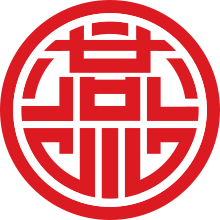Yanjing University
| 燕京大學 | |
 |
|
| Motto | 因真理 得自由 以服務 |
|---|---|
|
Motto in English
|
Freedom Through Truth For Service |
| Active | 1919–1952 |
| Location | Beijing, China |
| Yenching University | |||||||||||||||||||||
| Traditional Chinese | 燕京大學 | ||||||||||||||||||||
|---|---|---|---|---|---|---|---|---|---|---|---|---|---|---|---|---|---|---|---|---|---|
| Simplified Chinese | 燕京大学 | ||||||||||||||||||||
| Hanyu Pinyin | Yānjīng Dàxué | ||||||||||||||||||||
|
|||||||||||||||||||||
| Transcriptions | |
|---|---|
| Standard Mandarin | |
| Hanyu Pinyin | Yānjīng Dàxué |
| Bopomofo | ㄧㄢ ㄐㄧㄥ ㄉㄚˋ ㄒㄩㄝˊ |
| Gwoyeu Romatzyh | Ianjing Dahshyue |
| Wade–Giles | Yen1-ching1 Ta4-hsüeh2 |
| IPA | [jɛ́n.tɕíŋ tâ.ɕɥě] |
| Yue: Cantonese | |
| Yale Romanization | Yingīng Daaihhohk or Yīngīng Daaihhohk |
| Jyutping | Jin3ging1 Daai6hok6 or Jin1ging1 Daai6hok6 |
Yenching University (Chinese: 燕京大學; pinyin: Yānjīng Dàxué), was a university in Beijing, China, that was formed out of the merger of four Christian colleges between the years 1915 and 1920. The term "Yenching" comes from an alternative name of old Beijing derived from its status as capital of Yan state, one of the seven Warring States that existed until the 3rd century BC.
Yenching University was formed through the merger of four Christian schools over the course of five years, from 1915 to 1920:
John Leighton Stuart was appointed as the principal of the university in January 1919 when he taught Greek in Nanking Theological Seminary (金陵神學院), a seminary in Nanjing. Being short of capital at the beginning, he turned to fundraising worldwide and received support from the estate of Charles Martin Hall, an American executive of Alcoa Aluminum. The university bought the royal gardens of a Qing Dynasty prince to build a scenic campus and employed gardeners from the Imperial gardens. In 1926 the campus was completed. Theology, Law and Medical were the main schools in the university, with Arts and Science studies.
Stuart determined to create a university that served the Chinese nation. He attracted major Chinese and Western scholars to teach. Religion was not a qualification, although Stuart gave major support to the School of Theology. Among the first was William Hung, who became Chairman of the History Department and Dean. In 1928 the Harvard-Yenching Institute, was jointly founded by Yenching University and Harvard University for the teaching of the humanities and social sciences in East Asia. Under Hung, the university's reputation for Chinese studies steadily rose, especially with the publication of the Harvard-Yenching Sinological Index Series. By 1930, the school was among the top universities in China, its teaching distinguished itself by a considerable academic freedom.
...
Wikipedia
